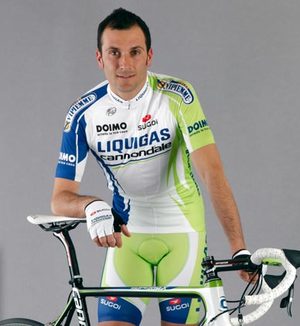Why it isn't good to stop eating
Category: Cycling & Environment
What happened? Well, I have always had problems with food, but when I get stressed I stop eating. I don't find the time and I don't have the energy to eat. The last three months I have been more stressed than ever.
I can live with having some food problems. I am used to it. But I also know that I must change my eating habits if I would like to start participating in some masters swimming or take part in a cycling race. Something else wouldn't be healthy and I would not reach my full potential.
Still some athletes continue to train hard, despite suffering from an eating disorders, like anorexia athletica. For sure, professional sport isn’t healthy. The training you and I are doing is. A pro athlete knows how it is to push the body over the edge and they know that they can't eat whatever they want, or do whatever they want.

I can give you an example about one thing Ivan Basso avoids to eat. Peas. He says [said?] it is because they are ‘too fat’. That isn't exactly a healthy idea of food. If we disregard that the body can’t survive without fat, the whole fattening thing about peas are wrong. Most of the food with lower fat contents are basically fruit, herbs and potatoes, according to USDA National Nutrient Databas. Peas are also high in fiber, protein, vitamins, minerals, and lutein.
However, as a food phobic, I am myself a very picky eater. For example, I don't eat apples with red or yellow peel, but I can actually taste one with green peel. Sometimes people ask me why I don't eat certain things and often I feel like I can't tell the truth because I'm afraid what they will think about me and I often end up saying that I'm allergic. I'm not allergic to anything, really, but I have a phobia that makes eating difficult. It's better to be honest with people. "I don't eat this because I don't like the taste/the smell, it contains too much calories, it isn't healthy".
To constantly avoid certain food isn't a good way. If it has become an extreme eating pattern it can indeed be dangerous, but maybe even more dangerous for people who look up to that person. First of all, you have your own ideas of healthy food and then you hear about other people's ideas and start eating a little bit more like them, but keeping your own idea of healthy food and suddenly, it isn't very healthy at all.
“Someone who really starves himself will feel the rebound of that, sooner or later”, Bert De Cuyper said in an interview to Daily Peloton in 2006. “I presume there are a few riders in the peloton who could be classified under ‘anorexia atletica’. That’s a sub clinical form of anorexia nervosa.
The self-discipline and weight obsession is equally extreme in both, but body weight is ‘only’ 10% below that which is considered normal. With actual anorexia patients the body weight is 15% or over below normal body weight. The difference in appearance is relatively big; you could still say that riders like Basso and [Michael] Rasmussen [who used to eat pretty much rice waffles and soy milk only] are aesthetically beautiful, but you can take it from me that that’s definitely not the case for actual anorexia patients. When I show video footage of anorexia patients to a group of dietitians in training -often young girls who are a risk group themselves- you can feel a shudder go through the room. Actual anorexia is life-threatening, we’re talking about people whose bodies are so devastated that they remind you of concentration camp pictures. There’s no way someone with anorexia nervosa could still deliver results as a professional sportsman or – woman.”
Eating disorders can go undetected for a long time, but that doesn't mean it doesn't exist or that the person in question isn't suffering from an eating disorder. If you meet somebody who seems to suffer from some kind of eating disorder, don't be afraid to talk to them. If someone around you suddenly becomes very preoccupied with food, stops eating or avoiding certain food or if that person has suddenly lost a lot of weight or talks about needing to lose weight when they don't appear to need it. Talk to them and say that you are worried.
For a pro athlete, the weight is sometimes important, but if an athlete suffers from an eating disorder, he/she will soon start being tired, he/she will lose endurance, coordination and speed and that's not what you want. Instead of starving yourself and eating too little, start to eat. It's not even necessary that you will gain weight, but you will almost immediately start feeling strong again. Isn't that great?

